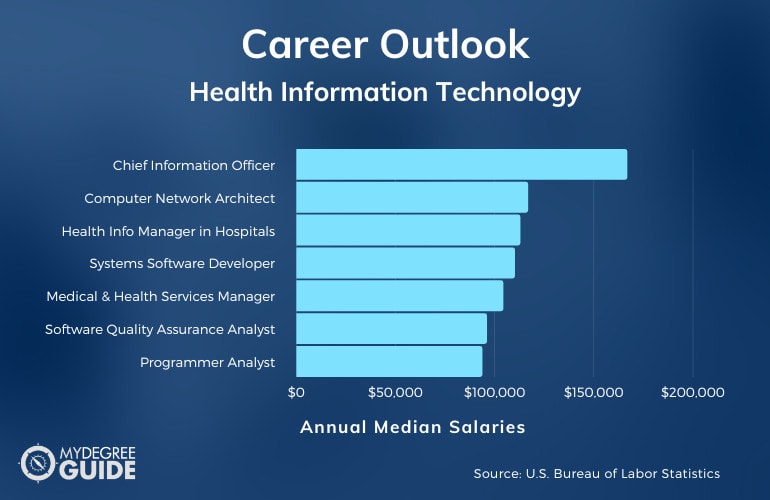Looking for Health Information Technology Bachelor’s Degrees Online for 2024? Compare degree programs, career options, and salaries.

In a health information technology bachelor degree program, you may learn to improve healthcare outcomes through data management.
Editorial Listing ShortCode:
As electronic health records become increasingly integral to medical practice, the demand for experts in this area continues to rise. This program can help you lead modern healthcare facilities into the future.
Universities Offering Health Information Technology Online Bachelor’s Degree Programs
Methodology: The following school list is in alphabetical order. To be included, a college or university must be regionally accredited and offer degree programs online or in a hybrid format.
1. Augusta University
Augusta University began in 1928 and is more than a public postsecondary school. It also incorporates essential research and innovations to solve real-world problems in the medical, science and educational communities. Students at Augusta University can acquire an undergrad, graduate, or doctoral degree in a variety of fields.
- BS in Health Information Administration
Augusta University is accredited by the Commission on Colleges of the Southern Association of Colleges and Schools.
2. Capella University
Starting in 1993, Capella University provides degree path options that meet the learning styles of all students. Offer two paths for learners to gain an undergraduate, graduate, or higher, CU allows students to be directors of their education using self-paced programs or a faculty-guided path.
Capella University strives to change the look of online public education.
- BS in Information Technology – Health Information Management
Capella University is accredited by the Higher Learning Commission.
3. CUNY School of Professional Studies
Opening in 2003 as a way to address the needs of adults, businesses, and other organizations to improve workforce training, CUNY School of Professional Studies severs as a public postsecondary school. CUNY has several online and in-person bachelor’s and master’s degrees and workforce training programs in a variety of professions.
- BS in Health Information Management
The CUNY School of Professional Studies is accredited by the Middle States Commission on Higher Education.
4. Dakota State University
Helping students to earn an associate’s, undergraduate, or graduate degree since 1881, Dakota State University is a highly respected public college. Dakota State helps students push the envelope and become creative thinkers and leaders in their field. With access to both online and on-campus courses, DSU has a path for all learning styles.
- BS in Health Informatics & Information Management
Dakota State is accredited by the Higher Learning Commission.
5. Davenport University
Davenport University has been working to assist adults in gaining higher education since 1866. This private school offers traditional and accelerated class options to students seeking bachelor, masters, or doctoral degrees in a plethora of program majors.
Popular majors at Davenport University include health care, education, and technology. Students have the chance to take classes online or through traditional means.
- BS in Health Information Management
Davenport University is accredited by the Higher Learning Commission.
6. East Carolina University
East Carolina University is a leader in public education and has been open since 1907. ECU is located In North Carolina but serves students in several countries worldwide. Students at ECU has many program options in their pursuit of a bachelor’s, master’s, or doctoral degree. ECU Is one of the top educators of health care professionals in North Carolina. The university is also recognized by U.S. News & World Report as one of the top public schools in the country.
- BS in Industrial Technology – Health Information Technology
East Carolina University is accredited by the Southern Association of Colleges and Schools Commission on Colleges.
7. Ferris State University
Ferris State University commenced in 1884 as a public co-educational college that is now regarded for its intense research and academic achievements. FSU is the ninth-largest university in the MI and serves almost 15,000 students annually.
With twenty campuses across the state and a dynamic e-learning platform, FSU grants undergraduate, postgraduate, and doctoral degrees in an array of academic disciplines.
- Bachelor’s in Health Information Management
Ferris State University is accredited by the Higher Learning Commission.
8. Fisher College
Fisher college opened in 1903 in Boston, MA. Since its commencement, Fisher College has expanded to several satellite campuses across the state. As a private educational institution, FC is dedicated to providing affordable education to all.
FU’s has a diverse academic catalog giving students the ability to acquire a two-year, four-year, or graduate-level educational degree.
- BS in Health Information Management
Fisher College is accredited by the New England Commission of Higher Education.
9. Franklin University
Franklin University is a substantially sized private academic institution that began in 1902. Located in Ohio, Franklin University provides e-learning options and campus-based programs that assist students in acquiring an undergraduate, postgraduate, or doctoral-level degree.
Some majors offered at FU include education, health care technology, and business.
- BS in Health Information Management
Franklin University is regionally accredited by the Higher Learning Commission.
10. Grand Canyon University
Grand Canyon University is a private, faith-based school that opened in 1949. GCU has hundreds of degree programs that help students procure have a four-year degree through a doctoral-level education. Grand Canyon University caters to individual learning styles offering traditional learning options, hybrid classes, and distance learning opportunities.
- BS in Health Information Management
Grand Canyon University is accredited by the Higher Learning Commission.
11. Granite State College
As one of NH, most affordable public schools, Granite State College opened in 1972 and now offers both distance learning and in-class learning options. GSC takes pride in its ability to provide a rigorous curriculum that trains students in their degree field.
GSU offers all learners a supportive environment with programs that lead to associate, bachelorette, and master’s degrees.
- BS in Health Care Management
Granite State College is accredited by the New England Commission of Higher Education.
12. Herzing University
Founded in 1965, Herzing University Focuses on providing an environment that fosters have a focus on career development, student success, and Flexible learning options.
With a pathway to an associate degree, bachelor’s, or postgraduate’s education, students at Herzing University develop critical thinking in leadership skills that will assist them in their future endeavors.
- BS in Health Information Management
Herzing University is accredited by the Higher Learning Commission.
13. Indiana University
The idea of Indiana University was first initiated in 1820. As one of the nation’s most astounding research colleges, Indiana University provides affordable public education to all students. It offers hundreds of academic majors to help students acquire hands-on knowledge while achieving a degree at any academic level.
- BS in Health Information Management
Indiana University is accredited by The Higher Learning Commission.
14. Louisiana Tech University
Louisiana Tech University stated in 1894 as a space-grant institution, though several name changes accrued from growth and development over the years, it became a renowned public research University. Offering degrees that range from undergraduate to a doctoral degree, LTU stands out with its expensive academic catalog.
- BS in Health Informatics and Information Management
Louisiana Tech University is accredited by the Southern Association of Colleges and Schools Commission on Colleges.
15. Purdue University
Purdue University has been providing high-quality public education since 1869. Purdue University strives to incorporate technology and research into every curriculum, giving students a flexible option to obtain an associate, undergraduate, or postgraduate degree.
Serving students around the globe, PU tries to set a positive example in Environmental and community care.
- BS in Health Information Management
Purdue University is accredited by the Higher Learning Commission of the North Central Association of Colleges and Schools.
16. Rasmussen College
Opening in 1900, Rasmussen College Has a variety of degree options that range from an associate to a master’s degree. This private school allows students to gain an education from an online or in-class format. Popular courses at RC include health care technology, human service, business, and much more.
- Bachelor’s in Health Information Management
Rasmussen College is accredited by the Higher Learning Commission.
17. Saint Joseph’s College of Maine
Saint Joseph’s College is a faith-based postsecondary school that was created in 1912. Providing students a place to learn and develop educationally and spiritually is essential to the Saint Joseph’s College values. Students looking to gain an undergraduate or graduate degree will receive fundamental content knowledge with a liberal arts foundation.
- BS in Health Information Management
Saint Joseph’s College is accredited by the New England Commission of Higher Education.
18. Southern New Hampshire University
As one of the most respected private colleges in the nation, Southern New Hampshire University has an abundance of degree programs leading to students obtaining a bachelor, graduate, or doctoral degree.
Beginning in 1932, Southern New Hampshire University has experienced significant growth and now serves students worldwide through traditional and e-learning formats.
- BS in Health Information Management
Southern New Hampshire University is accredited by the New England Commission of Higher Education, Inc.
19. University of Central Florida
Excelling in space exploration and educational programs, The University of Central Florida began in 1963. This public research academy has hundreds of academic programs for students looking to advance their personal and career opportunities by earning an undergraduate, graduate, or professional degree.
Students studying at the University of Central Florida have the chance to attend online or on-campus.
- BS in Health Informatics and Information Management
The University of Central Florida is accredited by the Southern Association of Colleges and Schools Commission on Colleges.
20. University of Cincinnati
As one of the most dated public universities in the state, the University of Cincinnati opened its doors in 1819. Today, this world-renowned university serves thousands of students every year and is recognized as a top research facility by U.S. News & World Report. It grants students undergraduate, graduate, and doctoral degrees in a variety of program majors.
- BS in Health Information Management
The University of Cincinnati is accredited by the Higher Learning Commission.
21. University of Toledo
As an economic and academic powerhouse, the University of Toledo began in 1972 and has led the way in medical research and technology innovations ever since. Allowing students to discover a passion for public higher learning while earning an undergraduate, graduate, or doctoral degree is imperative to the mission of UT.
- BS in Health Information Administration
The University of Toledo is accredited by the Higher Learning Commission.
22. University of Wisconsin
Opening in 1948, the University of Wisconsin is a highly respected public school that has obtained forty-one Pulitzer prizes since its founding. This university system spans over twenty-six campus settings throughout the state and offers all levels of degree options, from four-year and beyond.
UW is globally known for its education facilities, advances in research, and community outreach.
- BS in Health Information Management and Technology
The University of Wisconsin is accredited by the Higher Learning Commission.
23. Weber State University
As a national leader in private education, Weber State University started in 1889 and became a Junior College in 1933. WSU offers more than 100 programs that allow students to obtain a two-year, four-year, or graduate degree. Students at Weber State come from all over the US and from more than 60 other countries globally.
- BS in Health Information Management
Weber State is accredited by the Northwest Commission on Colleges and Universities.
24. Western Governors University
Allowing students a self-paced degree opportunity, western governors University commenced in 1997. This online learning community leads the way in private education by continually working to meet the needs of an ever-growing technologically advanced society.
WDU has a vast collection of programs that lead to bachelor’s and master’s degrees.
- BS in Health Information Management
Western Governors University is accredited by the Northwest Commission on Colleges and Universities.
25. Western Kentucky University
Established in 1906, Western Kentucky University is a public school that utilizes the semester-based academic calendar to reach thousands of students every year.
Offering an array of degree programs that lead to a bachelor’s or master’s degree, Western Kentucky University has online learning options for those needing a more flexible program.
- BS in Health Information Management
Western Kentucky University is accredited by the Southern Association of Colleges and Schools Commission on Colleges.
Online Health Information Technology Bachelor Degrees

Health information technology (HIT) involves data management for healthcare settings. As a professional in this field, you may work with databases and other software programs for data entry and analysis. You may even be responsible for building new systems that your healthcare organization can use to keep track of patient information or billing records.
Information technology (IT) is important in many business settings. Healthcare organizations rely on many of the same data-management principles as other companies, but they also have some unique needs. For that reason, health information technology is a distinct branch of study.
This is a good field to go into if you’re interested in both computer science and healthcare. You may get to delve into computing and networking topics and learn how to apply them in health settings. The work that you do may help doctors provide effective care, hospitals manage their budgets and patients take charge of their own wellbeing.
To earn this degree, you’ll take classes that help you learn more about the healthcare system. These may include lessons on delivery structures, reimbursement methods, terminology, electronic health records, and health laws and policies.
Other courses will address IT topics. For example, you might learn about programming languages, databases and network security. Project management classes can also help you prepare to carry out IT work.
You may also study administrative skills. As a leader in healthcare organizations, you’ll draw on those lessons again and again.
Potential roles you can pursue with a degree in health information technology are in medical organizations, such as hospitals, surgical centers and public health departments. You may become a records technician, an information systems manager or a health services manager.
Employment opportunities may also be found in organizations that support medical providers. For example, you may provide IT services for a pharmacy chain, a manufacturer of medical supplies or your state’s public aid department. You might also be a developer for a medical software company.
After completing your health informatics bachelor’s degree, you may want to continue your education with graduate studies. A master’s degree in healthcare informatics is worth it to consider as it may open many more career possibilities.
Health Information Technology Careers & Salaries

Healthcare organizations need clinical providers, but they also need people with business expertise. With a bachelor’s in health information technology, you may be ready to work on the management and administrative side of healthcare. However, there are programs leading specifically to a health information management (HIM) degree for students interested in that specialty.
When you first get started in informatics, your job might involve keeping track of health records. You may perform data entry, audit records or file payment requests.
As an IT professional, you may carry out duties to support the network and security infrastructure of your organization. You might make sure that the systems needed for data entry are running well. You might also build databases that other employees can use to organize records.
A healthcare information technology degree may also qualify you to take management roles. This might involve analyzing data and using it to set the direction for your organization.
According to the U.S. Bureau of Labor Statistics, approximately one-third of medical and health services managers work in hospitals. Others commonly work in physicians’ offices, nursing homes, outpatient facilities and government agencies.
There are also informatics jobs to be had in organizations that support healthcare providers. These may include health insurance companies and pharmaceutical manufacturers.
Although you’ll take classes that are specific to the healthcare field, many of the information technology skills that you’ll learn may be transferable to other industries. As a result, you may eventually choose to shift to a different sector. For example, you may become a data analyst or a network director in the business world.
According to the Bureau of Labor Statistics, the median annual wage for the computer and information technology field is $91,250. Some careers include:
| Careers | Annual Median Salary |
| Chief Information Officer | $166,770 |
| Computer Network Architect | $116,780 |
| Health Information Manager in Hospitals | $112,870 |
| Systems Software Developer | $110,140 |
| Medical and Health Services Manager | $104,280 |
| Software Quality Assurance (QA) Analyst | $96,040 |
| Programmer Analyst | $93,730 |
| Information Security Analyst in Healthcare | $89,900 |
| Medical Records Administrator | $82,640 |
| Health Information Technician | $44,090 |
The health information technology bachelor degree salary examples on this list are not a guarantee of personal earnings. Gaining experience, earning certifications or getting a master’s degree may allow you to advance in your organization and earn higher salaries.
Health Information Technology Curriculum & Courses

You will need to earn about 120 credit hours before you can graduate with your bachelor degree in health information technology. Some of the courses you take will cover general education topics, such as college algebra, biology and world history. Many others will be specific to your major.
- Coding and Billing: This course will introduce you to the medical codes used for classifying procedures and submitting bills.
- Data Security: You’ll learn to protect classified health data by building secure networks.
- Database Design: In this class, you will learn how to create databases and customize them for your organization’s needs.
- Electronic Health Records: EHRs have become the standard for medical records, and you’ll learn to use them in this class.
- Health Analytics: Analyzing health data allows leaders to determine effective treatment plans and make wise business decisions.
- Healthcare Laws and Ethics: This course will cover the government regulations that guide healthcare billing, treatment and privacy, and it will also explore your ethical obligations as a healthcare worker.
- Medical Terminology: In this class, you’ll become familiar with words, phrases and abbreviations used in healthcare settings.
- Network Management: You can prepare for an IT career by learning about the components and structures of computer networks.
- Object-oriented Programming: Becoming proficient at the basics of programming will come in handy if you need to design custom software for your organization.
- Project Management: Learning to oversee teams and supervise projects from beginning to end can help you provide leadership in your IT department.
There may be a capstone course to complete your program. That class may provide a review of the topics covered over the previous semesters. During the capstone, you may earn practicum hours at a health facility in your area.
Choosing a Bachelor’s in Health Information Technology Degree

You’ll need to select a school for your bachelor’s in health information technology. There are several factors to consider when deciding where to attend.
First of all, do you want to go to school on campus or online? While some people prefer face-to-face interaction with faculty and students, online may be a better choice for many people. You may be particularly interested in online study if you:
- Are organized and self-motivated
- Are returning to school as an adult
- Have a full-time job
- Have already earned many college credits and just need to finish off your degree
- Want to complete your bachelor’s studies quickly
If any of those characteristics describe you, then you might be a good candidate for an online health information technology degree.
Even among online schools, there can be a good deal of variation. For example, some colleges use year-round calendars, and others stick to traditional semesters. Be sure to look into an online school’s schedule, residency requirements, technology platform and student support services before you commit.
Accreditation is another factor to consider. Schools with regional accreditation can be counted on for quality academics.
For health information technology programs, programmatic accreditation can also be important. The Commission on Accreditation for Health Informatics and Information Management Education (CAHIIM) grants program-specific accreditation in this field.
Attending a CAHIIM-accredited school ensures that your curriculum meets current industry standards. Other factors to consider include:
- Cost of tuition and fees
- Core courses and elective options
- Graduation rate
- Practicum or capstone requirements
To learn more about where schools rank on these characteristics, consult the admissions department. An admissions counselor can often answer your questions and provide enrollment guidance.
Admissions Requirements

Getting into college begins with the application process. Online schools use a variety of criteria to determine whether you may be a good fit for their programs.
- Application form: Personal details and contact information are recorded on this paper or online form.
- High school transcript: You’ll need to prove that you’ve completed high school coursework, and you may need to have achieved a certain GPA.
- Test scores: The ACT and SAT are commonly used to assess your readiness for college coursework.
Other application requirements may include essays, letters of reference and a fee. If you’re applying as a transfer student, you may need to provide college transcripts and proof of prerequisite courses.
In addition to reviewing materials that you submit, an admissions counselor may want to set up an interview with you. This helps the school get to know you, and it also allows you the opportunity to ask questions.
Accreditation

If you want to know that you’re going to a top school, be sure to choose one that holds regional accreditation. Having regional accreditation means that a college has proven itself as an educational leader. Schools that do a poor job of producing qualified graduates can’t earn this distinction.
Regional accreditation is granted by select organizations. See the Council for Higher Education Accreditation (CHEA) for the complete list of regional accreditors.
Colleges have to undergo a review process before receiving accreditation, and they must occasionally renew their status. To be approved, schools must demonstrate that they maintain high academic standards, support students and operate in an ethical manner.
Attending a regionally accredited school may help you transfer your credits elsewhere or get into a master’s program. An accredited degree may also help you qualify for good jobs.
Health Information Technology Professional Organizations

As a health information professional, you may have a lot in common with others who work in IT. Even still, there are aspects of your job that will often be unique to the healthcare field. For that reason, you may want to collaborate with other health information leaders who may understand the ins and outs of your job.
Health information technology organizations provide opportunities for networking, education and professional growth. Joining one or more groups might allow you to learn from others and share your insights with them as well.
- American Health Information Management Association: AHIMA keeps members informed about the latest developments in health information and contributes to updates for medical coding guidelines.
- American Society of Health Informatics Managers: ASHIM offers continuing education and certification programs to ensure that information professionals stay current on trends, developments and new technologies.
The annual membership dues for an organization may grant you access to a slate of benefits. You may be able to watch free webinars, read cutting-edge journals or receive newsletters in your email inbox. Plus, your dues may contribute to advocacy efforts on behalf of the healthcare informatics industry.
In addition, you may be able to connect with other professionals in your nearby area. Some groups offer local chapters that hold regular meetings or events.
Health Information Technology Licensing and Certification

Adding credentials to your resume may be a great way to let potential employers know that you are an informed, experienced HIT professional. To earn certifications, you usually have to complete coursework and take a test. After meeting the qualifications, you may be able to advertise yourself as a certified professional.
- Certified Professional in Health Informatics: AHIMA no longer offers the CPHI certification but instead offers other credentialing programs in this field, including Registered Health Information Technician (RHIT), Certified Health Data Analyst (CHDA) and Certified Coding Specialist (CCS).
- CHISP Health IT Certification: After earning professional experience or going through the ASHIM Health IT Professional training program, you can sit for a certification exam that covers IT skills and healthcare knowledge.
As you gain professional experience or more education, you may be eligible to add additional credentials to your resume. The more certifications you earn, the more you’ll show yourself to be a dedicated HIT professional who is committed to continual improvement.
Certifications usually need to be renewed every few years. To keep using your credentials, you might have to take continuing education classes, pass a review exam or pay a fee. The renewal process can help you stay up to date on the latest developments in your field.
Financial Aid & Scholarships

Earning a bachelor degree in health information technology may increase your earning potential, but you’ll have to pay school tuition first. Keeping your schooling costs down can help you get a good education without putting a large dent in your future financial security.
The Free Application for Federal Student Aid (FAFSA) is a form that you’ll fill out to learn whether you qualify for government assistance programs. Most state governments and university financial aid departments also ask that students fill out this application.
You might receive grants from the government. This free money may pay for a portion of your tuition. You would not have to return the funds later.
Government loans allow you to borrow money to pay for school. After graduation, you’ll need to start making payments on your loans. You’ll also need to pay interest, but government loans usually have lower interest rates than private ones.
Winning scholarship money can help you afford school as well. There’s no sure way to secure a scholarship, but the more applications you send in, the greater your chances may be. You can check with national organizations, businesses and local clubs to see what types of scholarships they offer.
Consider what characteristics make you a unique individual because they may help you stand out as a top candidate for these awards. You may win because of your good grades, volunteer experience or ambitious post-graduation plans. Some programs are only for minority students or single parents.
Your college’s financial aid department may be able to provide additional assistance.
What Can You Do With a Health Information Technology Degree?

Medical organizations rely on electronic health records (EHR) to keep track of critical data. With a bachelor’s in health information technology, you may provide valuable leadership related to EHR activities in your organization.
Your responsibilities might include inputting data, maintaining databases, building networks, overseeing computer security and performing analytics. Your job title might be coding auditor, quality assurance lead, health services manager or health information technician.
As you advance, you might move into leadership roles like senior data analyst, IT manager or risk manager. Becoming a certified medical coder or earning other industry credentials may help you qualify for some informatics positions.
What Degree Do You Need to Be a Health Information Technician?

Some schools offer a Bachelor of Science in Health Information Technology. Others offer a similar program that includes “healthcare informatics” in the name. Either of these programs can help prepare you to provide health IT services for hospitals, pharmaceutical companies, government health agencies and other organizations with a medical focus.
Another option is a Bachelor of Science in Health Information Management. If, in addition to enjoying IT work, you’re also interested in business, then this may be a good degree path for you. HIM professionals often use data analytics to make business decisions for their medical organizations.
Is Health Information Technology a Good Career?

Doctors and nurses used to use paper files for all of their record-keeping, but now electronic health records have become standard. As a result, healthcare organizations are dependent on IT professionals who understand healthcare issues and also know how to maintain their databases and networks.
In addition, healthcare needs are increasing. The American population is getting older and requires more medical attention. As a result, the need for healthcare workers — both clinical and administrative — is growing. Plus, HIT jobs often pay well. The average salary in the health information technology field is $91,250 per year (Bureau of Labor Statistics).
Is a Bachelor’s in Health Information Technology Worth It?

Yes, a bachelor’s in health information technology is worth it for many students. In the healthcare field, jobs are projected to grow at a rate of 15% in the next 10 years (Bureau of Labor Statistics). Common careers in this field include health information technician, medical records administrator, health information manager, and health services manager.
If you enroll in an accelerated online program, you might have your degree in just a few years. The work you invest during that time may quickly pay off.
Health information technology is an in-demand field with many employment opportunities. Earning this degree may qualify you for various IT jobs in healthcare organizations. It can also help prepare you to earn industry certifications.
After getting a bachelor’s degree, you may be able to go on and get a master’s degree if you want to advance your career even further. You may study informatics, health information management or healthcare administration at the graduate level.
Are There Any Affordable Bachelor’s in Healthcare Informatics Programs?

Yes, a college degree can be affordable! With a bit of research, you may find an appealing health information technology program that costs around $300 to $500 per credit hour. To calculate the total cost, multiply the number of required credit hours by the price per credit, and add on any additional fees.
You may find good rates at your state’s public universities. Keep in mind that online school is sometimes cheaper than being on campus since you won’t have to pay for room and board. Financial aid, scholarships and school payment plans may also help you afford a degree.
How Long is a Healthcare Informatics Bachelors Degree?

Traditionally, it takes four years to earn a bachelor’s degree. If you’re a motivated student, you may be able to do it faster.
Some online informatics programs offer fast-track classes. You take one or two classes at a time and then move on to the next set as soon as you complete them. This year-round schooling eliminates unnecessary downtime between semesters.
If you have already earned an associate degree or have other college credits, you may not need to take as many classes to get your bachelor’s degree. The more credits you transfer in, the faster your program may be.
Getting Your Health Information Technology Bachelor Degree Online

You may start a career in healthcare administration and management by earning a bachelor degree in health information technology. The work that you do may pay well, and it may also be personally satisfying since you’ll know that you are contributing to others’ health and wellness.
If you’re ready to get started in this needed field, take a look at online degree programs. Studying health information technology online can help you fit college classes into your busy life. To learn more about what online studies can do for you, speak to an admissions counselor, or submit applications to your top schools.
